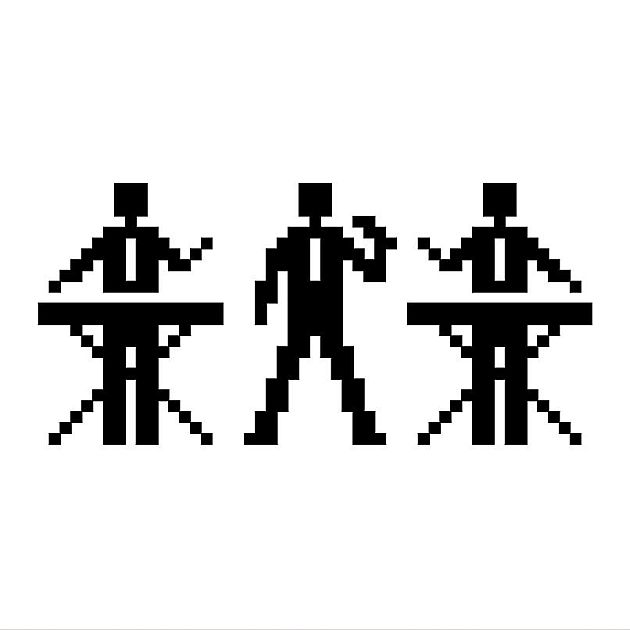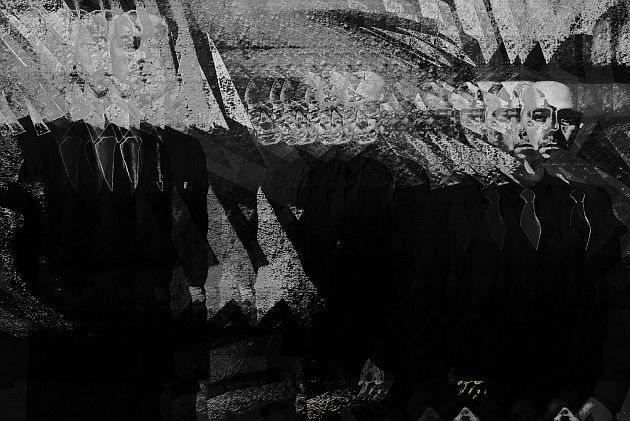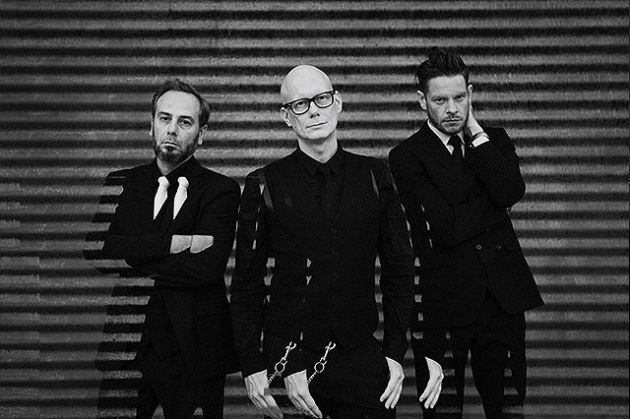 Interview with
Interview withJoakim Montelius (programming) from Covenant
For me personally, COVENANT stand for diversity, philosophical inspiration but above all energetic twist and fantastic sounds. Being present in alternative music world for years, they have built the solid name that is widely recognized, appreciated and acclaimed. About music, live shows, change and life… with Joakim Montelius.
Reflections of Darkness RoD: Last show I saw you at… Wroclaw Industrial Festival (November 2019), the most renowned fest in Poland (celebrating its 18th birthday in 2019 btw) - and you on it. For some, inviting COVENANT was a controversy, for some, a treat… do you think of yourselves as able to stand Industrial genre or is it still mostly Synth Pop? Crossing borders has always seemed to me to be your thing. How do you feel about it? How did you feel about the show? Why did you agree to take part in in the first place?
Joakim Montelius [JM]:Industrial music, in all of its shapes from THROBBING GRISTLE and CABARET VOLTAIRE over NON and the Cold Meat Industry stuff right up to contemporary things like PUCE MARY or PHARMAKON, has always been an important influence to us. If you listen for it, the industrial influence can be heard on everything we have ever released, even the poppier stuff. Crossing boarders, as you put it, is pretty much COVENANT’s raison d’être. Both mentally and physically.
RoD: In Prague and in Wroclaw you played in combination two musicians plus... zero (Praha) or plus a visual artist (Wro). Does it signal some significant changes in COVENANT set-up?
JM: No. We are just inviting more of our friends and collaborators to join us more actively. Sometimes everyone is too busy to come along and then we improvise.
RoD: You cooperate with many musicians now - Daniel Myer, Daniel Jonasson, Andreas Catjar, also Bengt Rahm (visual artist) or Marie Dragontown (performing at ‘False Gods’)... what is the reason for such versatility… are COVENANT searching their own way in new times? Rebranding themselves?
JM: It is not really a conscious strategy. Eskil and I have been doing our own thing for so long that it sometimes gets difficult to avoid repeating ourselves. We have many talented and inventive friends, so why not ask them to take part and bring some fresh ideas? Bengt, for example, is not just a visual artist. He is a published author, he runs the record label Labrador, he makes superb dance music under the name ANFANG and lots of other stuff. It is inspiring to be around people like him.
RoD: You have been present at alternative scene for a while… tell me, what has presenting your music to the audience used to be for you and what it is now? Has your perception of artistic performance changed during the years and if so, how?
JM: I cannot respond to this question since I retired from playing live almost 10 years ago.

RoD: If you think about the change - what was the music for you, say, 15 years ago and now - how would you say your approach has changed?
JM: Hm. I think our basic idea, that change is the only constant, still holds true. To us, making music is a way to explore and to try to understand the world and ourselves. However, the older we get, the harder it gets to take radical steps ahead. Therefore, we need to push ourselves harder. In addition, we have opened up a lot in the last 10 years or so, as you pointed out above. COVENANT in 2004 was a hard core of three pretty stubborn individualists. COVENANT in 2019 is a growing family of people freely coming and going.
RoD: Your approach to tech novelties - you seem to appreciate ones, but what about media? Do you use them? FB, IG etc.… is it a must for an artist to exist?
JM: Yes. We are futurists and generally technological optimists. We believe that progress through invention is a good thing. However, social media is both a blessing and a curse. I actually think that a band should be a bit mysterious and somewhat “more” than just ordinary people. That illusion is, in many ways, shattered by the demand to be accessible. On the other hand, it gives artists a bigger reach and another platform to present themselves. So, I have mixed feelings about it. I also do not like that we (as in most people) seem to get shorter attention spans and have less patience with things that are a bit more demanding.
RoD: How about your music inspirations? Thinking about the “daily recordings” present during the last tour I’d say you pay attention to what surrounds you more? Are you paying attention to everyday life and its details more? Marking coffee smell, raindrops etc.? No? Or is it all Daniel Meyer’s idea? <guessing!>
JM: Absolutely. The whole ‘Fieldworks’ project is exactly about that. To get more in touch with the real world in order to get a richer experience of life. Perhaps it is a reaction to the often artificial (and that is artificial in a negative sense) feeling of the social networks we talked about before. I try not to theorise too much about it. But there is so much hiding in plain sight, all around us, all the time. Just as an example: we bought a little device called ETHER from the Russian mad genius SOMA Laboraties (https://somasynths.com/ether/). It is a sort of microphone for electromagnetic waves. I plugged in a recorder and headphones and took a bicycle ride around town. I could hear the traffic lights, the refrigerators in the supermarket, people’s cell phones connecting to the Wi-Fi networks… all the connections taking place all around us, all the time, but beyond our physical senses. It’s scary and wonderful at the same time.
RoD: Would you describe yourselves more as hedonists, escapists or epicurean? Has your approach towards life and art changed through years?
JM: We are a bit of all of that. Probably leaning more to the epicurean side with age. I can only speak for myself, but personally I notice that I get more capable to feel a sense of wonder the older I get. More humble and open to things I did not pay attention to when I was younger, perhaps.
RoD: What do you think about your audience? Who comes to COVENANT concerts now? What do you think they expect from you? Do you care about it to a great extent or rather try to be faithful to yourselves?
JM: We figured out that it is futile to try to predict what people want from us at a very early stage in our career, so we have never really done that. And I believe that that’s a major reason for us still being around. It keeps us free from any self-inflicted constraints and (I hope) it keeps people curious to find out what we are going to come up with next time.

RoD: What are your life priorities now, at this stage? Is it art, life, people, family, money, recognition, appreciation? What has driven you through the years?
JM: That depends on what aspect of life we are talking about. Curiosity and a drive to express ourselves have always been the fuel for COVENANT and that has not changed much. We are still curious and creative people. On a personal level, at least for me, I mostly try to view the world around me with a little less anxiety and anger. It is certainly not easy, considering the state we are in and where we seem to be heading, but I feel an obligation towards my children to be a bit more Zen about it. If I did not have COVENANT as a safety valve, it would probably be a lot more difficult.
RoD: Future plans - how is COVENANT going to evolve? What are we to expect, cause currently it seems it’s a big enigma - who’s going to perform in the next show, what the setlist will be etc… like in Prague Eskil said “Well, now I’m gonna play what I want…” (for Andreas being absent) - it’s electrifying, intriguing, but yet… arises questions - are you now more freestyle? Because I saw you preparing for the WIF show, it was pure perfection! Is it a kind of contrast? Is this contradiction intent?
JM: We rather like the current development. It is probably a result of our own personal development that COVENANT has become so open and fuzzy. We used to have all sorts of rules and we were perfectionist control freaks. It gets very tiresome in the long run. Eskil and I were in conflict most of the time, each pulling in the opposite direction and it ended up draining our creative energy until it became intolerably frustrating to get anything done. So it sort of happened by itself that we opened up and left each other more slack. We don’t quite know what the future will bring and that’s actually very liberating.
RoD: Do you have any mottos you live by, any mottos you would like to share with people who care about you and follow you?
JM: I like the motto that COVENANT uses: “Change is the only constant”.
RoD: What is life and music all about according to COVENANT?
JM: Isn’t that pretty much the same thing? Life inspires music and music inspires life.
RoD: Future plans… what are we to expect?
JM: Next up is a German tour and most probably the follow-up EP in the ‘Fieldworks’ project with the working title ‘Fieldworks: Manifestation EP’. After that, we will start working on the ‘Fieldworks’ LP. Unless we grow tired of that idea and do something completely different.
RoD: My personal interviewer question - the place to escape life rush - what is your type? Do you have any?
JM: The sea! No matter the weather, it always has a meditative effect on me. Luckily, I live very close to it, so I do not feel much life rush.
RoD: My last question: what is life, love and life?
JM: If I knew that, I would start my own religion. But I think the approach that the sadly demised Mark Hollis of TALK TALK suggested in the brilliant song ‘Life’s What You Make It’ makes a lot of sense:
“Baby, life's what you make it
Can’t escape it
Baby, yesterday's favorite
Don’t you hate it
Baby life’s what you make it
Don’t back date it
Baby, don’t try to shade it
Beauty is naked
Baby, life’s what you make it
Celebrate it
Anticipate it
Yesterday’s faded
Nothing can change it
Life’s what you make it
RoD: Thank you very much for your time






Comments powered by CComment